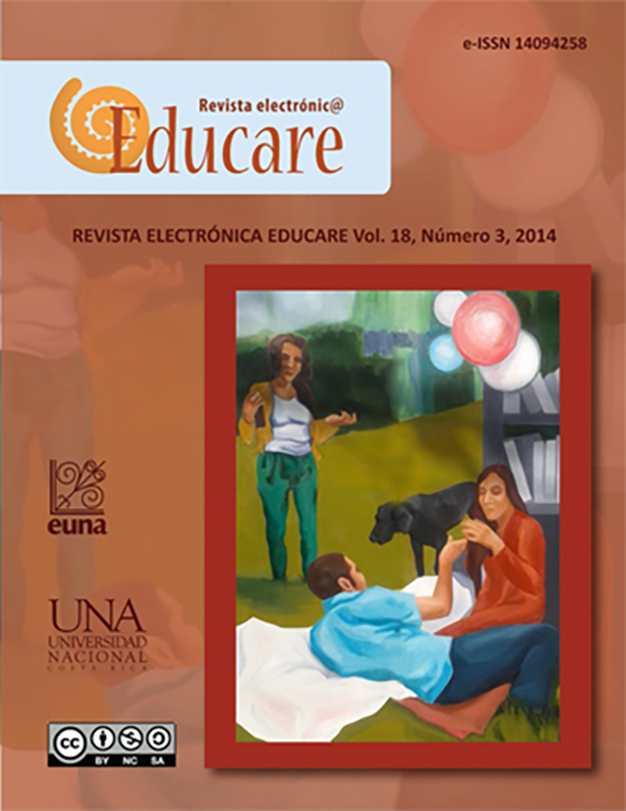Education and Assessment: Prophecy or Prediction
DOI:
https://doi.org/10.15359/ree.18-3.17Keywords:
Assessment, education, prophecy and prediction.Abstract
This essay takes a critical look at the visions and realities of educational evaluation. It is based on two assumptions that describe different contexts that can be used to analyze assessment characteristics. Faced with these two contexts, readers can make their own predictions or prophecies about the future of this process, which is relevant to ensure the quality of learning processes in educational institutions.References
Álvarez, J. M. (2008). Evaluar para conocer, examinar para excluir. Madrid: Morata. Recuperado de http://congreso.unter.org.ar/imagenes/9986.pdf
Bustelo, M. (2003). ¿Qué tiene de específico la metodología de evaluación? En R. Bañón (Ed.), La evaluación de la acción y de las políticas públicas (pp. 13-32). Madrid: Ediciones Díaz de Santos.
Díaz, J. (2005). La evaluación formativa como instrumento de aprendizaje en educación física. Barcelona: INDE.
Freire, P. (2004). Cartas a quien pretende enseñar. Buenos Aires: Siglo XXI.
Gimeno, J. (1982). La pedagogia por objetivos: Obsesión por la eficiencia. Madrid: Morata.
Gimeno, J. y Pérez, A. (1992). Comprender y transformar la enseñanza. Madrid: Morata.
Kirkpatrick, D. (2003). Evaluación de acciones formativas: Los cuatro niveles. Barcelona: Gestión 2000.
Oficina Regional para la Educación de América Latina y el Caribe (OREAL-UNESC0). (2008). Situación educativa de América Latina y el Caribe: Garantizando la educación de calidad para todos. Informe regional de revisión y evaluación del progreso de America Latina y el Caribe hacia la Educacion para Todos en el marco del Proyecto Regional de Educación (EPT//PRELAC). Santiago, Chile: Autor. Recuperado de http://www.unesco.org.uy/educacion/fileadmin/templates/educacion/archivos/documento_monitoreo_situacion_educativa.pdf
Salinas, D. (2002). ¡Mañana examen! La evaluación, entre la teoría y la realidad. Barcelona: Graó.
Downloads
Published
How to Cite
Issue
Section
License
1. In case the submitted paper is accepted for publication, the author(s) FREELY, COSTLESS, EXCLUSIVELY AND FOR AN INDEFINITE TERM transfer copyrights and patrimonial rights to Universidad Nacional (UNA, Costa Rica). For more details check the Originality Statement and Copyright Transfer Agreement
2. REUTILIZATION RIGHTS: UNA authorizes authors to use, for any purpose (among them selfarchiving or autoarchiving) and to publish in the Internet in any electronic site, the paper´'s final version, both approved and published (post print), as long as it is done with a non commercial purpose, does not generate derivates without previous consentment and recognizes both publisher's name and authorship.
3. The submission and possible publication of the paper in the Educare Electronic Journal is ruled by the Journal’s editorial policies, the institutional rules of Universidad Nacional and the laws of the Republic of Costa Rica. Additionally, any possible difference of opinion or future dispute shall be settled in accordance with the mechanisms of Alternative Dispute Resolution and the Costa Rican Jurisdiction.
4. In all cases, it is understood that the opinions issued are those of the authors and do not necessarily reflect the position and opinion of Educare, CIDE or Universidad Nacional, Costa Rica. It is also understood that, in the exercise of academic freedom, the authors have carried out a rogorous scientific-academic process of research, reflection and argumentation thar lays within the thematic scope of interest of the Journal.
5. The papers published by Educare Electronic Journal use a Creative Commons License:














 The articles published by Educare Electronic Journal can be shared with a Creative Commons License:
The articles published by Educare Electronic Journal can be shared with a Creative Commons License: 



